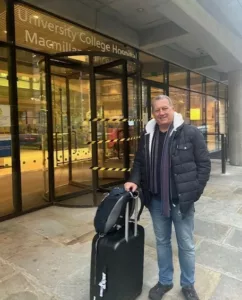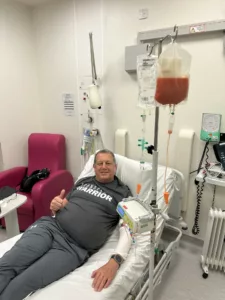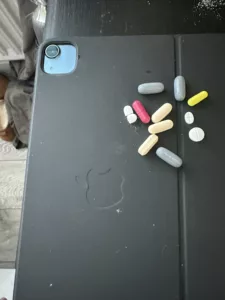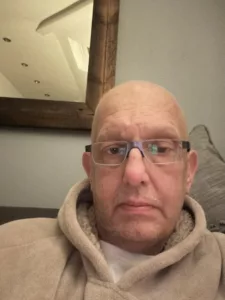
29 May 2024
Tony’s “good and bad days” with AML
“I don’t worry about the things I used to worry about – there’s nothing more important than my health. I’m going to live life and treasure every moment.”

The start of Tony’s journey
The first symptom of Tony Hayes’ leukaemia was extreme tiredness which affected him both at home and at work as a customer services manager for an online retailer.
Tony, who was 57 at the time and lives in North Weald, Essex, said: “My office is in a warehouse, and I have to climb two flights of stairs to see my boss. I would get to the top and think ‘I’m so tired today, I really need to lose weight and get fit’. At home, I started to struggle to even get out of a chair.”
Tony also has Type 1 diabetes which he manages with an insulin pump alongside regular blood tests. It was one of these regular tests, in March 2022, that picked up some potential cancer markers. This prompted another more detailed test which revealed more abnormalities. Tony was referred to the Princess Alexandra Hospital in Harlow for an MRI scan and a bone marrow biopsy.
Tony said: “I was getting concerned, but I just thought let’s do the tests and see what comes back. They told me I had myelodysplastic syndrome (MDS) which was something I could die with, rather than of. I was put on a ‘watch and wait’ treatment programme. I felt confident that it was something that progressed very slowly. I continued to feel very tired, but I managed it, with good and bad days.”
In May 2023, Tony had a routine bone marrow biopsy to assess the progression of MDS. It was after that he was told that the MDS had progressed to become aggressive acute myeloid leukaemia (AML).
Tony said: “I was called up to University College London Hospital (UCLH) and given the news, which was devastating. The consultant explained that, without treatment, I would have 18 months to live. They said the plan would be to give me a stem cell transplant, but it was a long and difficult road. My partner Debbie was with me, and it was a massive shock. But the consultant was brilliant and went through everything that was going to happen. I left feeling that I was going to be looked after and, under the circumstances, this felt comforting.”

Tony during his stem cell transplant
Two weeks later, Tony started the first of four cycles of the chemotherapy drug Venetoclax. His doctors also began the search for a suitable stem cell donor, starting with his brother Christopher and sister Julie, who was a nurse.
Tony said: “Christopher was desperate to be my donor, but he was only a 50% match. My sister turned out to be 100% but there was a complication. She had fibroids and was given a scan and then the doctors said she needed a hysterectomy. As they couldn’t rule out if she had cancer or not until afterwards, the risk of her donating cells to me with cancer in them was too great and we were both really upset that we couldn’t continue. So, we had to look elsewhere for a donor.”
Luckily a new donor was found for Tony via the Anthony Nolan Trust. A month later, on 12th December 2023, he had a stem cell transplant.
Tony said: “I was doing extremely well up until the transplant. UCLH has accommodation next door so you can live there and go to the hospital each day for your treatment. Previously, I had been able to walk down to Oxford Street and feel good. But after the stem cell transplant, I went back to my room at 3pm, lay down for a bit and woke up at 7.30pm with a temperature of 39 degrees. I rang the doctors, and they said I should go straight to A&E. I was in the high dependency unit at UCLH for six weeks with flu, a kidney infection and pneumonia. After I went home, I soon became ill again, and I had to go back for another fortnight. But despite all this, I came through it and the transplant worked.”
Tony, who’s now 59, has continued to make progress and is now having regular weekly clinic appointments to monitor his blood levels, which are nearing a normal range. He is hoping to return to his job in the next couple of months. The Anthony Nolan Trust also enabled Tony to anonymously get in touch with his stem cell donor.

Tony’s ‘morning cocktail’
Tony said: “The fatigue is still very hard. I try to get any jobs for that day completed in the morning because I am very tired by lunchtime. I’ve also had some skin rashes. I lost 3.5 stone, but the steroids meant I put all but a stone of that back on. The medication also stopped me from sleeping properly. But the best thing is my blood results are amazing. I saw the doctor last week and he said that my haemoglobin is better than his! My consultant has also since confirmed that a blood test on the DNA of my stem cells has revealed that the cells are 100% from my donor, so my body is no longer producing cancerous cells.
“My partner, Debbie, has been amazing. Her positivity has kept me going, and it’s something I’m determined to give back to others. When I was diagnosed, I struggled to find positive and supportive messages and stories online, everything was doom and gloom. I’m in a Facebook group for AML and I always try and put a positive comment in for people who are newly diagnosed. I don’t dress it up – it’s going to be hard – but I was in the same position and now I’m here.
“I’m a keen cyclist and I cannot wait to get back on my bike. I used to get up at 6am and cycle across the common near where I live and see all the deer – I can’t wait to do that again. I don’t worry about the things I used to worry about – there’s nothing more important than my health. I’m going to live life and treasure every moment.”

Tony 10 weeks post-transplant
Discover more stories from our community.
Related posts
16 November 2022
Leukaemia UK and Leukaemia Care urge benefits to be raised in line with inflation
Leukaemia UK and Leukaemia Care have written to the Chancellor to highlight the additional financial pressures faced by blood cancer patients and their families, ahead of the Autumn Statement this…
11 March 2022
Inquiry highlights the impact of COVID-19 on blood cancer services
A new report has recently been published, following an inquiry by the All-Party Parliamentary Group (APPG) on Blood Cancer and the APPG on Stem Cell Transplantation and Advanced Cellular Therapies, on the impact of Covid-19 on blood cancer services in the UK.
17 September 2024
The food industry’s great and good come together to celebrate 25 years of Who’s Cooking Dinner? and raise over £280,000 for leukaemia research.
London’s hottest charity culinary event, Who’s Cooking Dinner?, celebrated its 25th anniversary at The Dorchester on Monday (16th September). It was an event to remember with chefs including Tom Kerridge,…
4 September 2023
Less than 1% of Brits can identify all the most common symptoms of one of the deadliest types of cancer
New research launched today by Leukaemia Care and Leukaemia UK reveals that less than 1% (0.4%) of UK adults can accurately identify the four most common symptoms of leukaemia –…